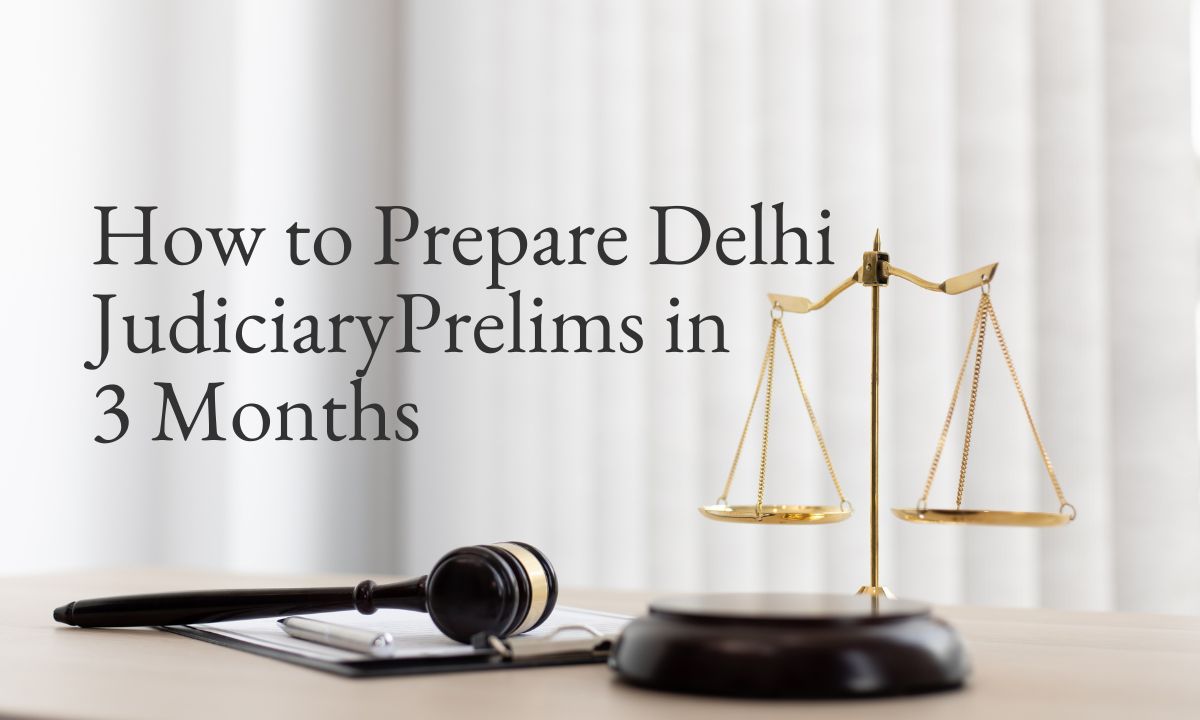+91 9990898327
Office : 632, Dr. Mukherjee Nagar, Delhi 110009
Mon-Sun: 09:00AM - 08:00PM

Delhi Judicial Services Preliminary Examination preparation in three months needs a planned approach, efficient time management, and consistent effort. Preliminary Examination is the initial phase of the screening exam for upcoming judges, and it demands cracking the right knowledge of the syllabus and well-planned study schedule. The current guide gives you a step-by-step pathway to assist you in maximizing your opportunity of success within a short span of time.
Delhi Judiciary Prelims is objective-type multiple-choice questions on various laws, legal reasoning, and general awareness. Following is the overview briefly:
Total Marks: 200
Duration: 2 hours 30 minutes
Negative Marking: 0.25 marks are deducted for each incorrect response
The exam mainly tests
Substantive and Procedural Laws: Indian Penal Code (IPC), Code of Civil Procedure (CPC), Code of Criminal Procedure (CrPC), Indian Contract Act, Indian Evidence Act, Arbitration and Conciliation Act, Specific Relief Act, Limitation Act, and other relevant laws.
Recent Legal Developments
General Knowledge and Current Affairs: National and international events, particularly law and government-related ones.
English Language
Ground Work
Study bare acts in detail, focus on definitions, illustrations, and procedural aspects.
Prepare a Daily Study Routine
Allocate time between reading laws, MCQ practice, and revising topics.
Take Notes for Rapid Revision
Mark key points and milestone judgments.
Practice Previous Year Papers
Fill up Remaining Laws and Weak Points
Clear out weak points that arose in Month 1.
Master Legal Provisions and Application
Attempt application-based questions.
Focus on Legal Developments and Current Affairs
Follow legal news websites like Live Law and Bar & Bench.
Increase Speed and Accuracy
Develop skills to eliminate wrong options at a glance.
Go back to Bare Acts and Landmark Cases
Carefully re-write Complete Syllabus
Offer sufficient time for weight-age topics.
Mock Tests and Performance Analysis daily
Weak areas analysis for error correction and improve weak points.
Practice Time Management
Create plans of speedy and precise answers.
Strengthen English and General Knowledge Preparation
Re-read important recent developments over the past six months.
Stay Healthy and Calm
Read Fundamental Rights, Directive Principles, Judiciary, and Amendments.
Read landmark judgments such as Kesavananda Bharati v. State of Kerala.
Read general principles, offences against the human body, property, and peace.
Read corresponding case laws and exceptions.
Understand jurisdiction, procedure, and major provisions.
Emphasize trial stages, appeal, and revisions.
Study relevancy, admissibility, burden of proof, and confessions.
Practice application-type questions.
Contract Act: Elements of a contract, void and voidable contracts.
Specific Relief Act: Injunctions and specific performance.
Limitation Act: Significant time limits and exceptions.
One can crack Delhi Judiciary Prelims in a three-month duration with the creation of a well-drafted plan, implementing it strictly, and constantly updating it. Focus on conceptual clarity on the highest plane, practice well, and adopt a positive frame of mind. If you strive diligently and be razor-sharp in preparation, you can pass Prelims and reach one step nearer to your final goal of becoming a judge.
Post a comment